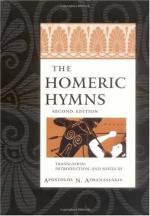Whosoever met the Dragoness, on him would she bring the day of destiny, before the Prince, far-darting Apollo, loosed at her the destroying shaft; then writhing in strong anguish, and mightily panting she lay, rolling about the land. Dread and dire was the din, as she writhed hither and thither through the wood, and gave up the ghost, and Phoebus spoke his malison:
“There do thou rot upon the fruitful earth; no longer shalt thou, at least, live to be the evil bane of mortals that eat the fruit of the fertile soil, and hither shall bring perfect hecatombs. Surely from thee neither shall Typhoeus, nay, nor Chimaera of the evil name, shield death that layeth low, but here shall black earth and bright Hyperion make thee waste away.”
So he spake in malison, and darkness veiled her eyes, and there the sacred strength of the sun did waste her quite away. Whence now the place is named Pytho, and men call the Prince “Pythian” for that deed, for even there the might of the swift sun made corrupt the monster. {124}
Then Phoebus Apollo was ware in his heart that the fair-flowing spring, Telphusa, had beguiled him, and in wrath he went to her, and swiftly came, and standing close by her, spoke his word:
“Telphusa, thou wert not destined to beguile my mind, nor keep the winsome lands and pour forth thy fair waters. Nay, here shall my honour also dwell, not thine alone.” So he spoke, and overset a rock, with a shower of stones, and hid her streams, the Prince, far-darting Apollo. And he made an altar in a grove of trees, hard by the fair-flowing stream, where all men name him in prayer, “the Prince Telphusian,” for that he shamed the streams of sacred Telphusa. Then Phoebus Apollo considered in his heart what men he should bring in to be his ministers, and to serve him in rocky Pytho. While he was pondering on this, he beheld a swift ship on the wine-dark sea, and aboard her many men and good, Cretans from Minoan Cnossus, such as do sacrifice to the God, and speak the doom of Phoebus Apollo of the Golden Sword, what word soever he utters of sooth from the daphne in the dells of Parnassus. For barter and wealth they were sailing in the black ship to sandy Pylos, and the Pylian men. Anon Phoebus Apollo set forth to meet them, leaping into the sea upon the swift ship in the guise of a dolphin, and there he lay, a portent great and terrible.
[Of the crew, whosoever sought in heart to comprehend what he was . . . On all sides he kept swaying to and fro, and shaking the timbers of the galley.] But all they sat silent and in fear aboard the ship, nor loosed the sheets, nor the sail of the black-prowed galley; nay, even as they had first set the sails so they voyaged onward, the strong south-wind speeding on the vessel from behind. First they rounded Malea, and passed the Laconian land and came to Helos, a citadel by the sea, and Taenarus, the land of Helios, that is the joy of mortals, where ever feed the deep-fleeced




